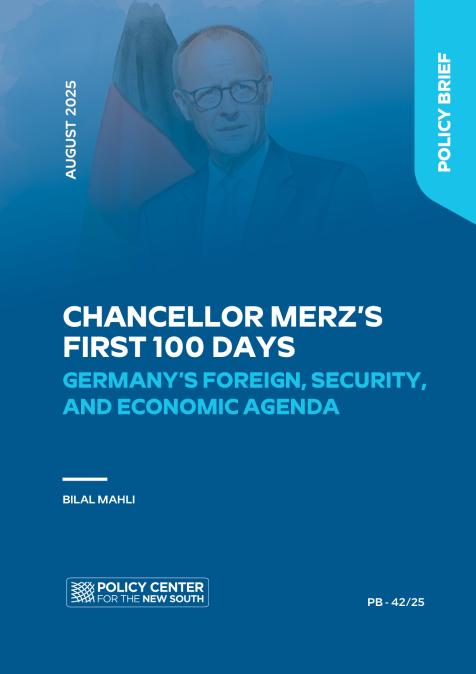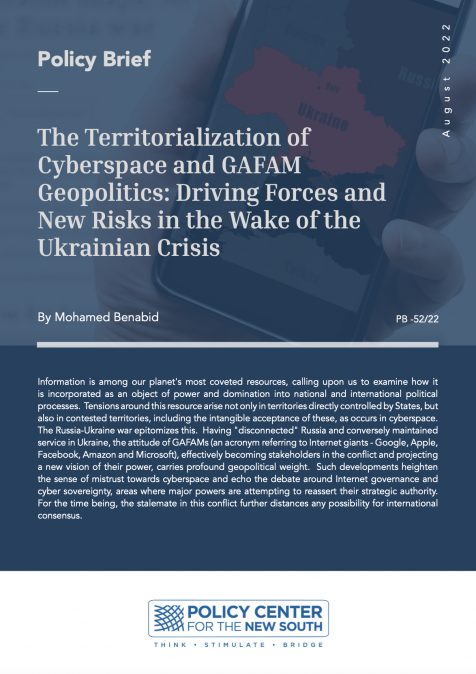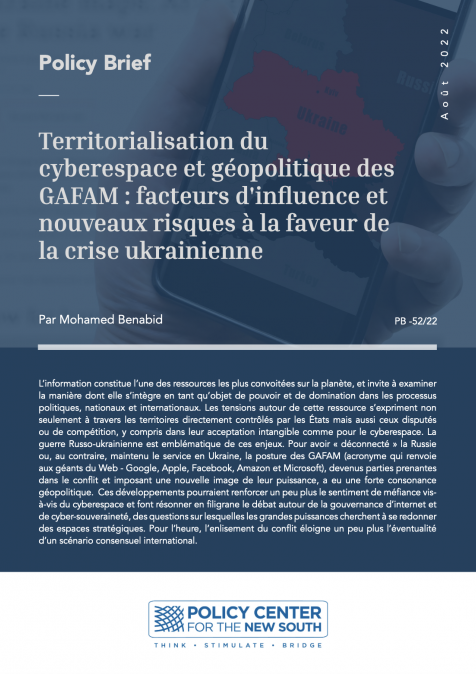Publications /
Policy Brief
This policy brief analyzes the first 100 days in office of Chancellor Friedrich Merz, which have been marked by an assertive foreign policy, ambitious security reforms, and a shift toward economic pragmatism. Merz has sought to reestablish Germany as a ‘leading middle power’, emphasizing closer European coordination, renewed transatlantic engagement, and unwavering support for Ukraine. However, his approach to the Gaza conflict, characterized by alignment with U.S. positions and reluctance to support ceasefire efforts, has exposed tensions with European Union partners and within his coalition. Domestically, Merz has pushed through a constitutional amendment to enable large-scale infrastructure investment, reversing his party’s traditional stance on borrowing. In security policy, he has launched institutional reforms and proposed significant defense spending increases. Yet, his government has lacked a coherent Africa strategy, focusing narrowly on migration control. The brief concludes that Merz’s ambitions are clear, but their success will depend on coalition cohesion, strategic clarity, and public support.
Introduction
Friedrich Merz’s appointment as Germany’s Chancellor on May 6, 2025, marked a turning point in the country’s political trajectory. The federal elections, held as an early vote on February 23, 2025, brought notable shifts in party strength. The Christian Democratic Union (CDU) secured 22.6% of second votes, marking a moderate gain compared to 2021, while the Alternative for Germany (AfD) almost doubled its share to 20.8%, becoming the second most popular party. The Social Democratic Party (SPD) suffered significant losses, falling from 25.7% to 16.4%, and the Greens also declined to 11.6%. The Left improved slightly to 8.8%, the Christian Social Union (CSU) made modest gains, and the Free Democratic Party (FDP) — a member of the outgoing “traffic light” coalition — failed to clear the electoral threshold, losing its representation in the Bundestag.
The outcome marked a decisive end to the ‘traffic light’ coalition of SPD, Greens, and the FDP, which governed from 2021 to 2025. In its place, a new CDU–SPD ‘grand coalition’ was formed, with CDU leader Friedrich Merz becoming Chancellor. Voter dissatisfaction with the previous coalition’s performance—particularly on economic management, migration policy, and internal cohesion—benefited the CDU and especially the AfD, whose surge underscores growing polarization and support for right-wing populist positions. The SPD’s steep drop suggests erosion of trust in its leadership, while the decline in Green votes reflects possible disillusionment with the pace or impact of climate policies. The FDP’s electoral collapse ended its federal parliamentary presence, removing a traditional pro-market voice from coalition calculus.
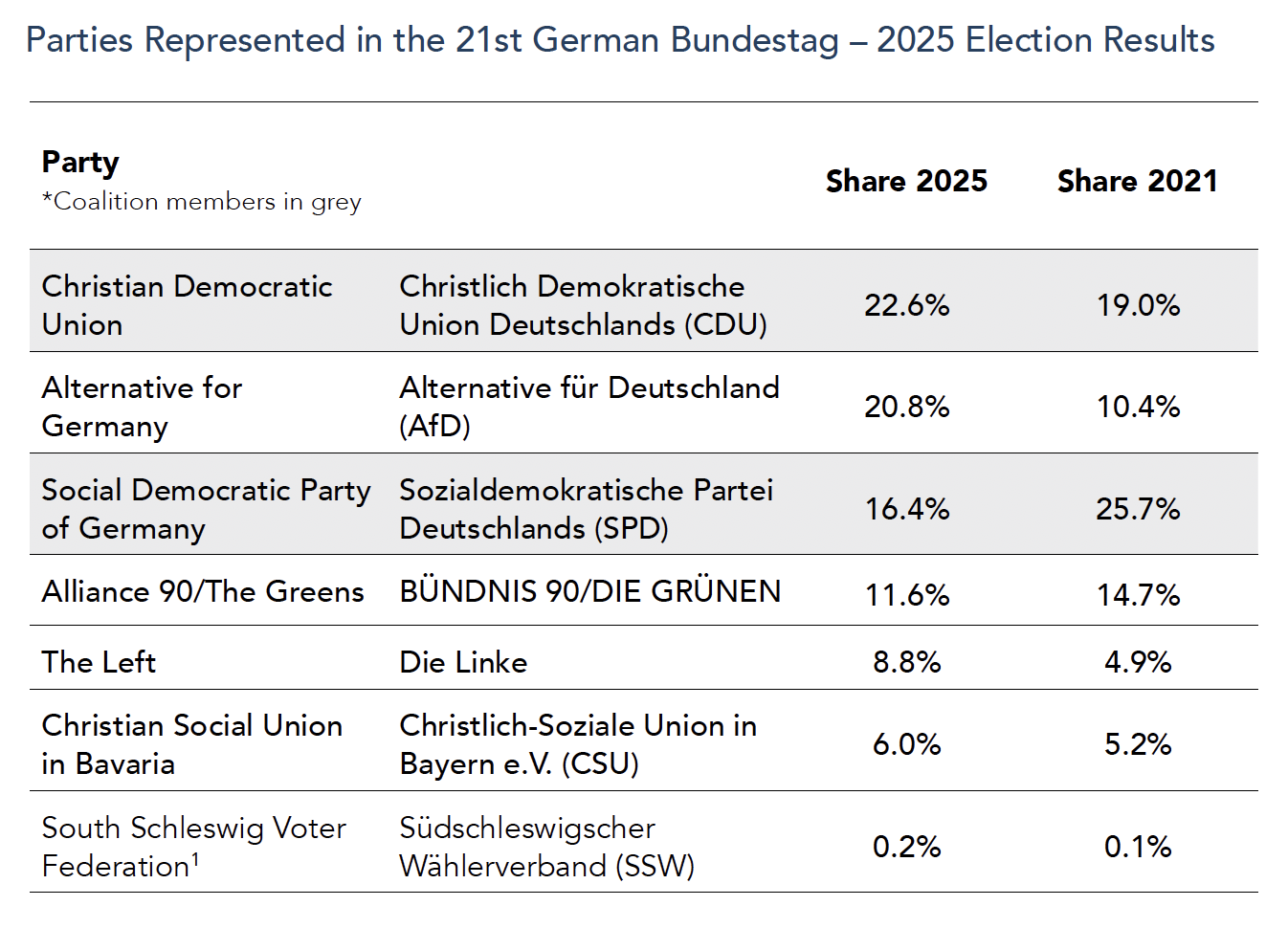
Taking office in the context of global instability, economic uncertainty, and growing domestic polarization, Merz inherited a fractured coalition, a weakened economy, and a foreign policy apparatus in need of direction. His first 100 days have offered early insight into his leadership style and governing priorities, revealing a bold but controversial attempt to reposition Germany as a more assertive and strategically autonomous actor.
This policy brief examines the core pillars of Merz’s early agenda—foreign policy, security, economic reform, and engagement with Africa—as well as his handling of the ongoing international crises. It assesses his ability to navigate internal political constraints, manage coalition tensions, and respond to international challenges. While Merz’s ambitions are clear, their implementation has exposed limits in terms of coherence, coordination, and credibility, which will shape the trajectory of his chancellorship.
1. Foreign Policy: Reaffirming European Leadership
In his first 100 days in office, Chancellor Friedrich Merz has placed foreign policy at the heart of his political agenda, seeking to reassert Germany’s influence in Europe and recalibrate its transatlantic posture in response to a shifting global landscape. His early actions mark a deliberate effort to distinguish his approach from that of his predecessor, SPD leader Olaf Scholz, whose foreign policy was often criticized for lack of clarity and dynamism.
Merz’s first international visits—to Paris and Warsaw on May 7—set the tone for his diplomatic priorities. In meetings with French President Emmanuel Macron and Polish Prime Minister Donald Tusk, Merz emphasized the importance of the Franco-German axis and the Weimar Triangle as pillars of European stability[2]. The announcement of a new Franco-German Defence and Security Council was a symbolic and strategic gesture, aimed at institutionalizing security cooperation in the face of Russia’s continued aggression in Ukraine.
Just four days into his term, Merz traveled to Kyiv to signal unwavering support for Ukraine[3]. In his inaugural speech before the Bundestag, he described the outcome of the war as decisive for Europe’s long-term peace and security[4]. Despite this strong messaging, his reluctance to take a clear position on delivering Taurus cruise missiles to Ukraine has left room for ambiguity. This cautious stance reflects both internal coalition sensitivities and a desire to maintain flexibility in an increasingly polarized international environment.
On May 9—Europe Day—Merz continued his diplomatic outreach with a visit to Brussels, where European Council President António Costa welcomed the “new energy” Merz brought to the European project[5]. The Chancellor’s emphasis on European integration is not only a reaction to Russia’s invasion of Ukraine but also a strategic hedge against the unpredictability of U.S. foreign policy in Donald Trump’s second term.
Merz’s transatlantic outlook, while fundamentally pro-NATO, is marked by a more assertive European tone. He has openly criticized what he has described as U.S. interference in German domestic affairs, particularly after Trump-aligned figures expressed support for the far-right Alternative für Deutschland (AfD)[6]. In response, Merz has called for a more self-reliant European foreign and security policy, arguing that Germany must prepare for a less-dependable American partner[7].
Overall, Merz has adopted a more energetic and outward-facing foreign policy, successfully restoring diplomatic rapport with key European partners. His emphasis on unity within the EU and NATO reflects a clear recognition of the geopolitical stakes posed by Russian aggression and American unpredictability. However, his administration’s vagueness on key defense decisions—such as the Taurus missiles—and its unclear stance on complex Middle East issues, including Merz’s controversial support for Israeli Prime Minister Netanyahu in the face of an International Criminal Court (ICC) arrest warrant, expose early limits to Germany’s strategic clarity.
The war in Gaza has emerged as one of the most contentious foreign policy issues for the Merz government, exposing both international isolation and domestic friction. Germany’s decision not to sign a July 21, 2025, joint statement by 25 countries—including France, the United Kingdom, and Canada—calling for a ceasefire, humanitarian access, and the release of hostages, drew criticism from EU partners and human rights advocates. Germany’s Minister for Economic Cooperation and Development, Reem Alabali-Radovan, publicly expressed dissatisfaction with the refusal, highlighting growing tensions within the coalition[8].
According to Merz, Israel’s right to self-defense remains a matter of “Staatsräson” (reason of state), reflecting what he describes as Germany’s historic commitment to Israel’s security. However, his framing of the conflict has raised concerns about the government’s unwillingness to push for de-escalation. Chancellor Friedrich Merz’s rejection of the ICC’s arrest warrant against Israeli Prime Minister Benjamin Netanyahu, prioritizing bilateral ties with Israel, aligned Germany with the U.S. opposition to the ICC’s authority, despite Germany’s obligations as an ICC member state.
In late May, Merz began to publicly distance himself from Israel’s actions, stating that the scale of civilian harm in Gaza could no longer be justified as a fight against Hamas, and questioning the strategic intent behind Israel’s military campaign[9]. On August 8, 2025, Chancellor Friedrich Merz announced a temporary halt to exports of arms that could be deployed in Gaza, framing the move as a response to Israel’s planned offensive on Gaza City and the associated humanitarian risks. While the decision was welcomed by parts of the SPD, it was criticized by segments of the CDU, Israeli officials, and Jewish organizations, underscoring divisions over the balance between solidarity with Israel and adherence to humanitarian principles[10].
Nevertheless, Merz’s approach reflects a deliberate prioritization of alliance loyalty and domestic political calculus over broader engagement with international legal norms or humanitarian diplomacy—a choice that may further constrain Germany’s credibility in the Middle East and beyond.
2. Security Policy: From Inertia to Strategic Assertiveness
Chancellor Merz has made security policy a cornerstone of his leadership, introducing what he has described as a “strategic cultural shift” aimed at transforming Germany from a reactive middle power into a proactive and reliable security actor[11]. Building on the lessons of the war in Ukraine and the fragmentation of European defense capabilities, his administration has pushed for increased military spending, institutional reform, and stronger integration with NATO objectives.
A major initiative within Merz’s first 100 days has been his proposal to amend Germany’s Basic Law to exempt defense spending above 1% of GDP from Germany’s constitutional debt brake. This unprecedented move, intended to fund military modernization and long-term support for Ukraine, could have significant fiscal implications. While the plan is bold, it has raised concerns among economists and members of Merz’s own coalition about inflationary pressures and debt sustainability.
Institutionally, one of Merz’s most notable reforms has been the creation of a National Security Council within the Federal Chancellery—a first in German postwar history. Designed to centralize and coordinate security policy across government ministries, the Council is led by Jacob Schrot, a known transatlanticist, with veteran diplomat Günter Sautter taking charge of foreign policy strategy[12]. This new body reflects an effort to streamline fragmented security policymaking and respond more effectively to external threats.
In terms of military procurement, Merz has positioned himself as a reformist, criticizing the inefficiencies of Europe’s fragmented defense landscape. His approach emphasizes both national rearmament and broader European defense industrial strategy.
Merz has also signaled Germany’s readiness to meet and potentially exceed NATO’s defense spending benchmarks. His administration has floated the goal of raising overall security-related spending to 5% of GDP, including 1.5% for critical-infrastructure resilience[13]. While this figure remains aspirational and politically contentious, it underscores his goal of repositioning Germany as a serious security actor in the context of U.S. retrenchment and Russian militarization.
Despite these efforts, Merz faces significant challenges in turning ambition into action. The proposed defense spending reforms are likely to face resistance from his coalition partner, the SPD, which remains wary of military escalation. Moreover, Germany’s more assertive military posture has drawn sharp criticism from Russian Foreign Minister Sergei Lavrov, who warned against what Moscow views as a rearmament of Germany under the guise of NATO compliance[14].
In sum, Merz’s early moves represent a clear departure from Germany’s traditionally cautious security stance. By embedding strategic planning in the heart of the Chancellery, and committing to larger defense investments, his administration has demonstrated seriousness about national and European security. Yet, the political and economic sustainability of this shift remains uncertain, particularly in the face of domestic skepticism and growing geopolitical volatility.
3. Economic Policy: Balancing Pragmatism with Political Risk
Germany is in a growth crisis: economic output is stagnating, productivity is rising only slowly, and major industries are losing international competitiveness. Structural problems including skilled-labor shortages, slow digitalization, and high energy costs, are being exacerbated by external pressures such as trade barriers and geopolitical uncertainty. Germany has faced a persistent economic growth problem, especially since the 2020s[15].
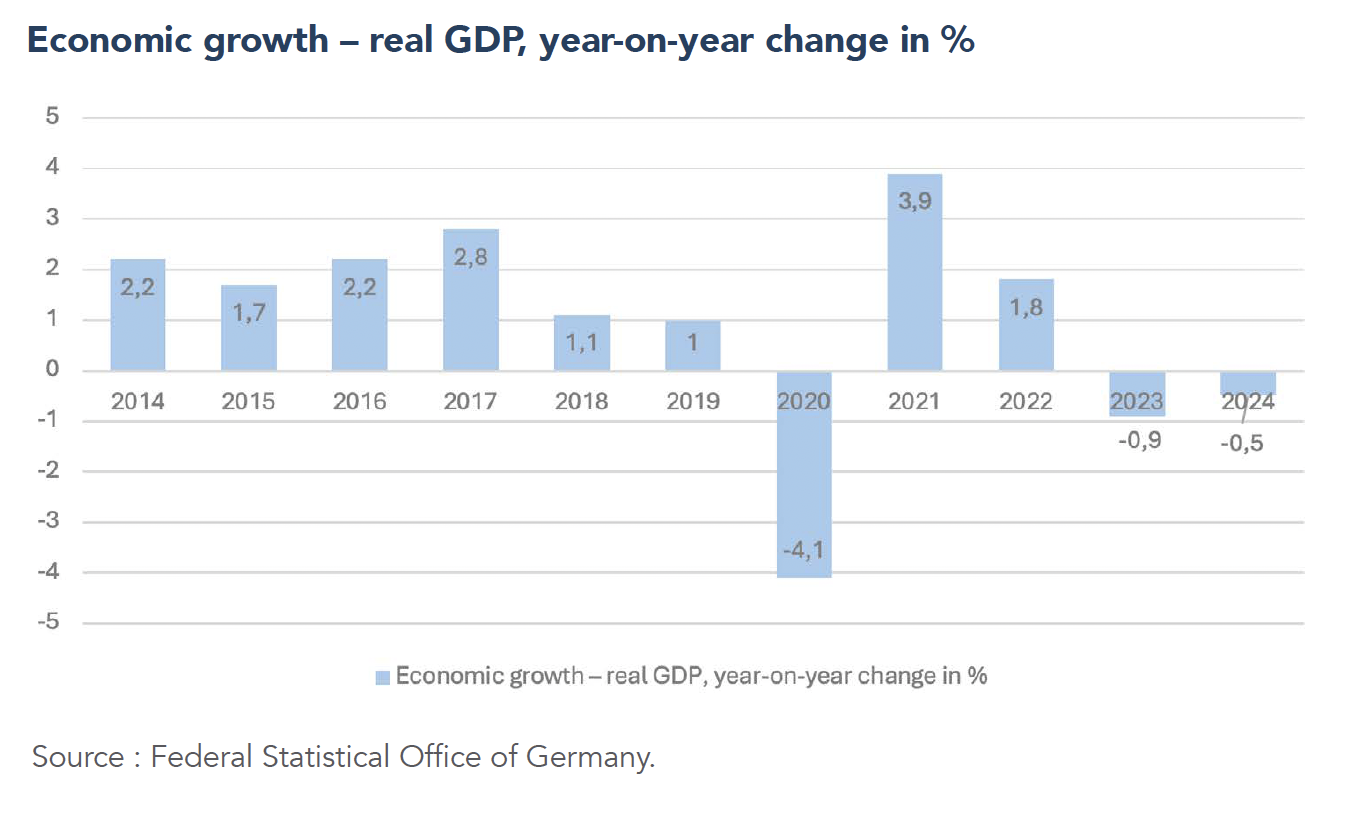 Friedrich Merz’s first 100 days in office have marked a clear pivot in Germany’s economic policy, shifting away from the fiscal conservatism traditionally associated with his party and embracing a more pragmatic, state-led investment approach. Confronted with economic stagnation, rising global competition, and the disruptive effects of U.S. trade policies, the Merz government has prioritized infrastructure renewal, labor-market flexibility, and industrial competitiveness.
Friedrich Merz’s first 100 days in office have marked a clear pivot in Germany’s economic policy, shifting away from the fiscal conservatism traditionally associated with his party and embracing a more pragmatic, state-led investment approach. Confronted with economic stagnation, rising global competition, and the disruptive effects of U.S. trade policies, the Merz government has prioritized infrastructure renewal, labor-market flexibility, and industrial competitiveness.
Central to this economic realignment has been the reform of Germany’s constitutional debt brake. In cooperation with the SPD, Merz backed an amendment to Germany’s Basic Law that established a €500 billion special investment fund to be deployed over the next decade. Of this, €100 billion is earmarked for state-level infrastructure and another €100 billion for climate-related initiatives[16]. Passed in March 2025 by the outgoing Bundestag, this reform allows borrowing outside the usual debt limits, signaling a significant break from Merz’s campaign rhetoric of fiscal restraint.
The shift is driven in part by external pressure. With President Trump’s introducing new U.S. tariffs on European exports, Germany’s export-heavy economy faces renewed vulnerability. In response, Merz has emphasized growth as a strategic priority, including support for market-driven solutions.
The Chancellor’s embrace of borrowing has not come without political cost. Many in the CDU/CSU ranks have criticized the debt brake reform as a betrayal of core conservative principles. This internal backlash played a key role in Merz’s initial failure to secure a parliamentary majority in his first confirmation vote.[17]
Nonetheless, the Merz government has framed its economic policy as a necessary recalibration in light of global economic fragmentation and technological change. By prioritizing infrastructure investment and supporting industrial resilience, the Chancellor has demonstrated a willingness to depart from ideological orthodoxy in favor of pragmatic statecraft. Still, the success of this strategy will depend on whether it can deliver tangible improvements in productivity, innovation, and consumer demand, without triggering a new round of fiscal instability.
4. Africa Policy: A Strategic Void Behind Migration Rhetoric
While Chancellor Merz has moved quickly to recalibrate Germany’s position on key European and global issues, his government’s engagement with Africa in his first 100 days in post has been selective and often framed through the lens of migration control. Public discourse has centered on irregular migration from Africa and the Middle East, which Merz portrays as a challenge to social cohesion and integration capacity. Even before becoming Chancellor, he proposed annual refugee admission caps of between 60,000 and 100,000, and supported deportations to countries such as Syria and Afghanistan, despite legal and humanitarian concerns[18]. These measures, now reiterated in office, appear aimed at addressing domestic anxieties and countering the far-right AfD’s growing influence.
There have, however, been limited but tangible steps in the economic sphere. On July 30, 2025, the federal cabinet approved the start of Germany’s ratification process for four European Union trade agreements with Côte d’Ivoire, Ghana, Cameroon, and members of the Southern African Development Community. Long in preparation at EU level, these agreements aim to provide a predictable framework for trade and investment, support local economic development in partner countries, and diversify supply chains for EU industry[19]. The initiative, brought to the federal cabinet by the Development Ministry, concerned Germany’s domestic ratification of agreements already negotiated at the EU level, signalling a willingness to deepen economic ties even if it does not yet amount to a comprehensive Africa strategy.
In a public appearance on August 24, 2025, Merz described Africa as the “great neglected continent” with the fastest growth potential, calling for new strategic partnerships “to mutual advantage”, and pledging to pursue this path consistently in the coming years[20]. This rhetoric marked a notable acknowledgment of Africa’s economic and geopolitical significance. However, beyond the trade agreements and stated intentions, no high-level diplomatic visits, new thematic policy frameworks, or significant financial commitments have yet been launched under Merz’s leadership.
As global competition for influence in Africa intensifies, Germany risks being perceived as reactive rather than proactive, if its intentions are not translated into action. A Chancellor-led engagement strategy that combines trade, energy cooperation, and security partnerships, is essential to ensure Germany’s relevance in a region increasingly central to global politics.
5. Challenges and Outlook: Ambition Meets Political Constraint
Friedrich Merz’s first 100 days in office have been defined by a clearly stated ambition to break with the cautious incrementalism of recent German leadership. His administration has advanced bold proposals in foreign, security, and economic policy, and he has positioned Germany as a more assertive actor on the European and global stages. Yet, the effectiveness of this new course will ultimately depend on Merz’s ability to navigate a series of interlocking political and geopolitical constraints that threaten to undercut his plans.
Chief among these challenges are tensions within his own governing coalition. The uneasy alliance between Merz’s CDU/CSU bloc and the SPD has already shown signs of strain, particularly around fiscal policy and migration. The internal backlash following Merz’s reversal on the debt brake—long a symbolic anchor of conservative economic thinking—exposed significant fractures within his party, and his initial failure to secure a parliamentary majority served as an early warning sign of potential instability. Disagreements over the direction and scope of borrowing, and over the Chancellor’s tougher stance on immigration, are likely to persist and may hinder the passage of more ambitious reforms.
At the same time, Merz must contend with rising political pressure from outside the governing coalition. The far-right AfD has continued to gain support, particularly in eastern Germany, capitalizing on voter dissatisfaction with migration and social cohesion. This electoral momentum limits Merz’s room for compromise and may complicate efforts to maintain centrist consensus within the Bundestag. In such a polarized environment, advancing complex legislative initiatives—especially those involving defense spending or structural reforms—may prove difficult.
Internationally, the geopolitical environment remains highly volatile. U.S. President Donald Trump’s second term has brought renewed unpredictability to transatlantic relations, particularly on trade and NATO burden-sharing. Merz’s balancing act—maintaining the alliance while asserting European autonomy—will be tested as American political cycles increasingly distract from stable coordination. Meanwhile, the ongoing war in Ukraine, Russia’s hostile posture, and China’s growing influence in Africa and the Global South require strategic consistency from Berlin, something Merz’s government has not yet demonstrated fully.
Compounding these external pressures is a sense of unresolved direction in key policy areas. While the Merz administration has taken visible steps toward rearming and repositioning Germany, questions remain about the sustainability of his defense and economic strategies. The goals he has set—from 5% of GDP spending on defense, to €500 billion in infrastructure investments—are ambitious, but they rest on political coalitions and public support that may prove fragile. Likewise, his administration’s lack of clarity on arms deliveries to Ukraine and the absence of a credible Africa policy risk undermining Germany’s long-term credibility as a global actor.
The next phase of Merz’s Chancellorship will be critical in determining whether his government can consolidate its early momentum into lasting influence. His vision of Germany as a ‘leading middle power’—assertive, integrated, and economically competitive—is compelling on paper. But delivering on that vision will require decisive leadership, along with political dexterity, coalition management, and strategic clarity. Unless Merz can translate ambition into action, the gap between Germany’s stated goals and its actual capabilities may widen again.
Bibliography
Besch, S., & Fix, L. (2025, May 7). Merz brings Germany back to the table. Foreign Policy. https://foreignpolicy.com/2025/05/07/friedrich-merz-chancellor-germany-foreign-policy-defense-security-russia-ukraine-trump-eu/
Bundesministerium für wirtschaftliche Zusammenarbeit und Entwicklung. (2025, July 30). Für verlässliche Handelsbeziehungen mit Afrika: Bundeskabinett leitet Ratifizierung von EU-Handelsabkommen mit afrikanischen Staaten ein. Bundesministerium Für Wirtschaftliche Zusammenarbeit Und Entwicklung. https://www.bmz.de/de/aktuelles/aktuelle-meldungen/handelsbeziehungen-mit-afrika-ratifizierung-eu-handelsabkommen-258626
Chambers, M., & Murray, M. (2025, February 24). Wary of Trump, Germany’s Merz warns it’s “five minutes to midnight for Europe.” Reuters. Retrieved July 28, 2025, from https://www.reuters.com/world/europe/merzs-conservatives-push-quick-coalition-talks-after-german-election-win-2025-02-24/
Deutscher Bundestag - Mehrheit für Reform der Schuldenbremse: 512 Abgeordnete stimmen. . . (n.d.). Deutscher Bundestag. Retrieved July 29, 2025, from https://www.bundestag.de/dokumente/textarchiv/2025/kw12-de-sondersitzung-1056916
deutschlandfunk.de. (2025, August 14). Waffenlieferstopp: Merz’ Kehrtwende in der Nahostpolitik sorgt für Diskussionen. Deutschlandfunk. https://www.deutschlandfunk.de/waffenlieferstopp-israel-merz-gaza-100.html
deutschlandfunk.de. (2024, March 16). Migration - CDU-Chef Merz fordert Obergrenze: Nicht mehr als 100.000 Flüchtlinge pro Jahr. Deutschlandfunk. https://www.deutschlandfunk.de/cdu-chef-merz-fordert-obergrenze-nicht-mehr-als-100-000-fluechtlinge-pro-jahr-100.html
Federal Chancellor Friedrich Merz in Kyiv| Federal Government. (2025, May 10). Website of the Federal Government | Bundesregierung. https://www.bundesregierung.de/breg-en/news/merz-in-kyiv-2347004
German Chancellor Friedrich Merz: clear messages from the outset. (2025, May 27). deutschland.de. https://www.deutschland.de/en/topic/politics/german-chancellor-friedrich-merz-the-first-weeks
Kampfner, J. (2025, June 9). Can Merz have an effective foreign policy? POLITICO. https://www.politico.eu/article/friedrich-merz-germany-effective-foreign-policy/
Langfristige Wirtschaftsentwicklung in Deutschland. (n.d.). Statistisches Bundesamt. Retrieved August 26, 2025, from https://www.destatis.de/DE/Themen/Wirtschaft/Volkswirtschaftliche-Gesamtrechnungen-Inlandsprodukt/BIP-Langfristig.html
Lory, G. (2025, May 10). New German Chancellor Merz aims for stronger EU ties with France and Poland. Euronews. https://www.euronews.com/my-europe/2025/05/09/new-german-chancellor-merz-aims-for-stronger-eu-ties-with-france-and-poland
Majumdar, R., & Sexton, K. (2025, May 26). Merz says Israeli actions in Gaza “no longer justified.” dw.com. https://www.dw.com/en/merz-says-israeli-actions-in-gaza-no-longer-justified/live-72666924
Marsh, S., & Rinke, A. (2025, July 23). Germany’s Merz faces pressure to toughen stance on Israel. Reuters. https://www.reuters.com/world/europe/germanys-merz-faces-pressure-toughen-stance-israel-2025-07-22/
Neuer Bundeskanzler: Merz kritisiert “absurde” Behauptungen der USA über Deutschland. (2025, May 7). DIE ZEIT. https://www.zeit.de/politik/deutschland/2025-05/bundeskanzler-friedrich-merz-usa-donald-trump-kritik-telefonat
Regierungserklärung von Bundeskanzler Friedrich Merz. (2025, May 14). Bundesregierung. https://www.bundesregierung.de/breg-de/service/newsletter-und-abos/bulletin/regierungserklaerung-von-bundeskanzler-friedrich-merz-2347888
The Moscow Times. (2025, July 28). Lavrov calls German army plans ‘Very worrying.’ The Moscow Times. https://www.themoscowtimes.com/2025/05/28/lavrov-calls-german-army-plans-very-worrying-a89251
Völlinger, V., Die Zeit, dpa, & Reuters. (2025, August 24). Bundesregierung: Friedrich Merz plädiert für Suche nach neuen Handelspartnern. DIE ZEIT. https://www.zeit.de/politik/deutschland/2025-08/bundesregierung-friedrich-merz-suche-handelspartner-zollabkommen-usa
_________________________________________________________________________
[1] The South Schleswig Voters’ Association (SSW) is exempt from the 5% electoral threshold as a recognized party representing the Danish and Frisian minorities in Germany.
[2] Lory, G. (2025, May 10). New German Chancellor Merz aims for stronger EU ties with France and Poland. Euronews. https://www.euronews.com/my-europe/2025/05/09/new-german-chancellor-merz-aims-for-stronger-eu-ties-with-france-and-poland
[3] Federal Chancellor Friedrich Merz in Kyiv| Federal Government. (2025, May 10). Website of the Federal Government | Bundesregierung. https://www.bundesregierung.de/breg-en/news/merz-in-kyiv-2347004
[4] Regierungserklärung von Bundeskanzler Friedrich Merz. (2025, May 14). Bundesregierung. https://www.bundesregierung.de/breg-de/service/newsletter-und-abos/bulletin/regierungserklaerung-von-bundeskanzler-friedrich-merz-2347888
[5] German Chancellor Friedrich Merz: clear messages from the outset. (2025, May 27). deutschland.de. https://www.deutschland.de/en/topic/politics/german-chancellor-friedrich-merz-the-first-weeks
[6] Neuer Bundeskanzler: Merz kritisiert “absurde” Behauptungen der USA über Deutschland. (2025, May 7). DIE ZEIT. https://www.zeit.de/politik/deutschland/2025-05/bundeskanzler-friedrich-merz-usa-donald-trump-kritik-telefonat
[7] Chambers, M., & Murray, M. (2025, February 24). Wary of Trump, Germany’s Merz warns it’s “five minutes to midnight for Europe.” Reuters. Retrieved July 28, 2025, from https://www.reuters.com/world/europe/merzs-conservatives-push-quick-coalition-talks-after-german-election-win-2025-02-24/
[8] Marsh, S., & Rinke, A. (2025, July 23). Germany’s Merz faces pressure to toughen stance on Israel. Reuters. https://www.reuters.com/world/europe/germanys-merz-faces-pressure-toughen-stance-israel-2025-07-22/
[9] Majumdar, R., & Sexton, K. (2025, May 26). Merz says Israeli actions in Gaza “no longer justified.” dw.com. https://www.dw.com/en/merz-says-israeli-actions-in-gaza-no-longer-justified/live-72666924
[10] deutschlandfunk.de. (2025, August 14). Waffenlieferstopp: Merz’ Kehrtwende in der Nahostpolitik sorgt für Diskussionen. Deutschlandfunk. https://www.deutschlandfunk.de/waffenlieferstopp-israel-merz-gaza-100.html
[11] Kampfner, J. (2025, June 9). Can Merz have an effective foreign policy? POLITICO. https://www.politico.eu/article/friedrich-merz-germany-effective-foreign-policy/
[12] Besch, S., & Fix, L. (2025, May 7). Merz brings Germany back to the table. Foreign Policy. https://foreignpolicy.com/2025/05/07/friedrich-merz-chancellor-germany-foreign-policy-defense-security-russia-ukraine-trump-eu/
[13] Deutscher Bundestag - Mehrheit für Reform der Schuldenbremse: 512 Abgeordnete stimmen. . . (n.d.). Deutscher Bundestag. Retrieved July 29, 2025, from https://www.bundestag.de/dokumente/textarchiv/2025/kw12-de-sondersitzung-1056916
[14] The Moscow Times. (2025, July 28). Lavrov calls German army plans ‘Very worrying.’ The Moscow Times. https://www.themoscowtimes.com/2025/05/28/lavrov-calls-german-army-plans-very-worrying-a89251
[15] Langfristige Wirtschaftsentwicklung in Deutschland. (n.d.). Statistisches Bundesamt. Retrieved August 26, 2025, from https://www.destatis.de/DE/Themen/Wirtschaft/Volkswirtschaftliche-Gesamtrechnungen-Inlandsprodukt/BIP-Langfristig.html
[16] Deutscher Bundestag - Mehrheit für Reform der Schuldenbremse: 512 Abgeordnete stimmen. . . (n.d.). Deutscher Bundestag. Retrieved July 29, 2025, from https://www.bundestag.de/dokumente/textarchiv/2025/kw12-de-sondersitzung-1056916
[17] Merz was not confirmed as chancellor on the first ballot, falling short of an absolute majority; media reports cited a range of possible factors, including internal dissent and broader coalition tensions. He was elected on the second ballot.
[18] deutschlandfunk.de. (2024, March 16). Migration - CDU-Chef Merz fordert Obergrenze: Nicht mehr als 100.000 Flüchtlinge pro Jahr. Deutschlandfunk. https://www.deutschlandfunk.de/cdu-chef-merz-fordert-obergrenze-nicht-mehr-als-100-000-fluechtlinge-pro-jahr-100.html
[19] Bundesministerium für wirtschaftliche Zusammenarbeit und Entwicklung. (2025, July 30). Für verlässliche Handelsbeziehungen mit Afrika: Bundeskabinett leitet Ratifizierung von EU-Handelsabkommen mit afrikanischen Staaten ein. Bundesministerium Für Wirtschaftliche Zusammenarbeit Und Entwicklung. https://www.bmz.de/de/aktuelles/aktuelle-meldungen/handelsbeziehungen-mit-afrika-ratifizierung-eu-handelsabkommen-258626
[20] Völlinger, V., Die Zeit, dpa, & Reuters. (2025, August 24). Bundesregierung: Friedrich Merz plädiert für Suche nach neuen Handelspartnern. DIE ZEIT. https://www.zeit.de/politik/deutschland/2025-08/bundesregierung-friedrich-merz-suche-handelspartner-zollabkommen-usa

